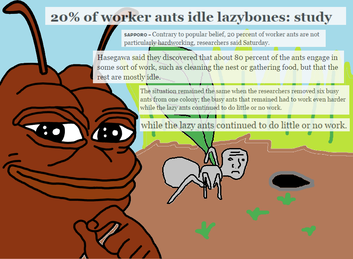NEET
A NEET is someone who is Not in Education, Employment, or Training. The acronym NEET originated in the United Kingdom in 1999 (likely as a more 'politically correct' term, to replace the previous designation of 'status zero') and has spread to other countries since then, including the United States, Japan, South Korea and Taiwan, though other terms such as "unemployed" or the more profound "disengaged" are much more prevalent in the United States, especially in official statistics.
Legal classification[edit | edit source]
The legal classification of a NEET varies from country to country. In the United Kingdom, the classification comprises people aged between 16 and 24 whereas in Japan, it comprises people aged between 15 and 34. Most NEETs under the age of 25, still live with their parents, and are male, however more men over 25 as a percentage of the American population are also becoming NEET.
Rise in numbers[edit | edit source]
Below age 25[edit | edit source]
Since 2007 the number of NEETs aged below 25 has increased on both sides of the Atlantic. According to the Organisation for Economic Co-operation and Development (OECD) in Paris, approximately 15% of young Americans qualified as NEETs in the first quarter of 2011, up from 12% in the same period in 2007.
Males age 25 to 54[edit | edit source]
Contrary to intuition, the amount of male Americans aged 25-54 not working rose 3 percentage points from 1996-2016, with the lion's share being those without a college degree. Those men who never had college experience had a 70.3% increase in labor force nonparticipation (from 8.8% in 1996 to 14.9% in 2016).[1] This rise continued during the 'economic recovery' after 2012.
Men vs. women[edit | edit source]
In the USA, the amount of men not working has increased 15% since 1950.[2] While the amount of women not working has decreased 15% since 1950.[3]
Ethnic countries[edit | edit source]
According to the World Bank, the Middle East (32.3%,) South Asia (30.3%) and Sub-Saharan Africa (23.9%) have the highest proportion of NEETs (dubbed 'ninis', the term used in most of Latin America, in their report, with the exception of Brazil, which uses the term "nem-nem") among 15-24 year olds.[4] The rise in NEETs is seen as a major cause of concern in some Latin American countries such as Mexico, where many NEETs serve as footsoldiers for the various drug cartels, due to lack of any other prospects.
Europe[edit | edit source]
In the 27 E.U. nations as a whole, the figure was 13.2%, up from 11.5% in 2007.[5] The figure was later revised in 2015 to 15.9% of 15-29 year olds being NEET, and there was substantial variation between member states, e.g the rate was 7.5% in the Netherlands and more than 20% in several relatively more economically deprived southern European countries, such as Spain, Croatia, Italy and Greece.[6]
NEET rates are also quite high in non-EU European countries, the Russian economist Anna Zudina estimated that 12-15% of Russians aged 15-23 were NEETs in 2015.[7]
Possible causes in America[edit | edit source]
Self-reported[edit | edit source]
NEETs on r/NEETs, yourenotalone.co, and sanctionedsuicide.com for example cite lack of romantic opportunities, technology, promiscuity among prospective partners, and illness caused by psychiatric or other 'medical' oversight of their central nervous system as causes of their NEETdom.[8][9]
[edit | edit source]
Binder (2019), through advanced mathematical modelling proved that two factors helped predict a decrease in males in the workforce, namely no-fault divorce and increased female workforce participation. Binder found that 28% of the variance in labor force dropout in the United States from 1965-2015 was caused by these two factors, combined with lower wages for non-college jobs (which also effects men's marriage prospects). Binder's explanation is that the men were simply responding to incentives; if changes in female employment and non-fault divorce (which he found to have had a permanent negative effect on marriage rates) made men's investment into a career to attract a stable long-term partnership a moot point, than many men will react to this by dropping out of the labor market altogether.
He also found a possible correlation between inceldom (in terms of not having had long-term relationships, such as cohabitation and marriage) and a lower prevalence of employment in non-college educated young men.[10]
The share of married, prime-age (25-54) men not participating in the labor market has declined in the last two decades in the USA. However there is an overall increase in labor nonparticipation among unmarried, prime-age men. Half of prime-age nonparticipating men are unmarried.[11]
The increase of the welfare state plays almost no role in employment nonparticipation among prime-age men in the USA. A tripling in usage of SSDI in America only accounts for a 0.5% drop in labor force participation among prime-age men. Nearly half of labor force nonparticipating prime-age men take pain meds, most being prescribed. Nonparticipation is correlated with automation and offshoring of 'middle-skill' (construction, maintenance etc) jobs, with a 10.7 decrease in middle-skill employment among Americans. Wages of employed men without a college degree have also decreased relative to the wages of men with college degrees (in terms of ratio).[12]
29% of women with children do not work,[13] which is 12% more than men with children.[14]
Commentary on stats[edit | edit source]
Not being married is a demotivation for men to work. The decline in total male labor force participation is mostly not explained by (the extremely small) increased sharing of child labor. The decline in male labor is mostly due to female hypergamy raising men's productivity standards too high as more highly educated women enter the workplace. Men who work less get divorced by women or lose their children, generally.
Some have laid the blame at feminism (at least in terms of no-fault divorce and women in the workforce) for these observations, citing Binder (2019) among others. Binder diplomatically didn't directly mention feminism in his paper.
Incel Wiki strongly believes that women should be paid for the 'emotional labor of having sex with men'. We believe NEETdom can be solved by making the pussy cartel in the USA independent contractors with a wage of 1 satoshi (the smallest unit of a bitcoin, equivalent to 100 millionth of a bitcoin. ie. $0.0010129848 U.S.D 2025) an hour, where it should be. One could also argue the cartel should be legally prosecuted for crimes against humanity and men should not have to pay women in resources or job security at all.
There are barriers to access of welfare unique to men. Twice as many women in the United States access food stamps for example.[15]
NEETdom and psychiatry[edit | edit source]
There is a small body of research linking NEET status to poor mental health, however it is not clear whether being mentally ill is causative of NEET status, if being a NEET is causing the poorer mental health outcomes, and/or if NEET men are just more likely to be labeled with 'illness' regardless if they actually have one. Likely all is true to an extent. Poor mental health can result in poorer school/work performance which results in NEET status, which then compounds the mental health issues. Also, parents of unemployed men often gaslight their children into psychiatric 'care' and push for a diagnosis, because unemployment itself is often seen as pathological.
A 2015 Swiss study did tend to find that the casual pathway of the association between NEEtdom and poorer mental health was more that poor mental health predicted being NEET, rather than NEETdom being associated with increased risk of depression.[16] This may be because the participants in the study were quite young (early 20s), as a later Greek study conducted in 2019 found that long-term NEETs and older NEETs were the most "at risk" for developing severe depression and anxiety.[17]
A 2015 study published in European Psychiatry also found that remittance of depression in NEETs didn't seem to improve their subsequent employment prospects much,[18] possibly due to them being poorly skilled and thus largely unemployable or there being a delay period before the pro-employment effects of the increased functioning made themselves known. Or that their depression was not caused by NEETdom itself but rather the social effects of unemployment, which can last for quite a while.
There is also evidence that most high-functioning autists (at least those symptomatic enough to be diagnosed) are very likely to be NEETs, Howlin (2000) examined the outcomes of individuals with Asperger's Syndrome and found that the vast majority were unemployed, with many being also under educated, despite not meeting the threshold for intellectual disability.[19] A later review of surveys of autistic adults found that the majority across a number of Western countries were unemployed and reliant on state benefits, though this study mixed high and low functioning autists.[20]
The eminent French Philosopher, Michel Foucault, famously argued that unemployed men in general being more likely to be diagnosed with mental illness by virtue of their unemployment alone, and not any broader concerns about their health or social functioning.[21][22][23]
NEETs who suffer from severe anxiety or similar mental states are close to becoming a Hikikomori.
Overlap between NEETs and incels[edit | edit source]
One would expect a large number of male NEETs to also be incel (NEETcel), due to female economic and educational hypergamy and the overlap between NEETdom and mental illnesses that generally hamper male sexual success (such as social anxiety and autism).
Many self-identified male NEETs who gather online on forums such as Reddit's r/NEETs report being incel.[citation needed] For example, one of the most famous self-identified incels, Joey, runs a chat room for NEETs that is advertized on r/NEETs, and incel posting became so frequent on r/NEETs that the moderators added a rule banning such discussion.[24]
Official academic research into the evidence seems to be inconclusive, i.e. a Greek Study from 2019 found that male NEETs aged 15-24 years old were actually roughly twice as likely to be married as non-NEETs[25] (with the the Odds-Ratio for female NEETs being similar). It is important to note that NEET status is quite common among younger Greek adults due to a terrible Greek economy, around 16% of young Greeks are NEET.
In the United States, The University of Michigan economics PhD candidate Ariel Binder's 2019 paper (mentioned above) found that the group he examined that were mostly long term NEETs (though he didn't use the term) were also more likely to report never having been married or having cohabited with a woman.[10] It is likely that most of these men are incel or nearcel, but a small fraction may have steady girlfriends or be able to get frequent casual sex with women.
Philosophy[edit | edit source]
Most NEETs want a job in theory, but are not enticed, skilled, or able enough to grab a job that would provide independence and mating. A vocal portion of NEETs are strictly against wageslaving entirely. In the USA in 2016, about 15% of men aged 25-54 without a job, had no desire to find a job, or about 1.6% of prime-age men in the USA total.[26] Below is a poem by an anonymous NEET who compares a wageslave's lifestyle to his own. If low-tier beta or omega NEETS do not make any attempts at careermaxxing, they are sometimes accused by members of the incelosphere as being volcel.
NEET vs hikikomori[edit | edit source]
Although NEETs share similarities with Hikikomoris, they are distinctively different from one another. Hikikomoris are likewise NEETs not employed, not enrolled in school or work-related training, and not engaged in housework. However, in contrast to NEETs, Hikikomoris are shut-ins who isolate themselves entirely from society due to mental illness. NEETs prefer to stay indoors, but unlike Hikikomoris, they are not psychologically restricted from going outside. Contrary to popular belief, some NEETs go outside and pursue exciting hobbies a wageslave or full-time worker could never pursue due to the time-consuming nature of hobbies.
Indeed, a study of 'disengaged youth' (NEETs) found subgroups of NEETs who were very highly engaged in community and social activities like church services, volunteering and travelling.[27]
See also[edit | edit source]
- Neets.me, a forum to talk about NEETdom
- Hikikomori
- NEET Army
- Kakuhido
- Herbivore Men
- Cope society
- Kiwi Farms
- MGTOW
- Behavioral sink
- Pauper
- List of famous NEETs
References[edit | edit source]
- ↑ https://www.kansascityfed.org/~/media/files/publicat/econrev/econrevarchive/2018/1q18tuzemen.pdf
- ↑ https://fred.stlouisfed.org/series/LNS11300001
- ↑ https://fred.stlouisfed.org/series/LNS11300002
- ↑ https://openknowledge.worldbank.org/bitstream/handle/10986/22349/K8318.pdf
- ↑ http://business.time.com/2012/11/05/why-the-u-s-has-a-worse-youth-employment-problem-than-europe/
- ↑ https://www.sciencedirect.com/science/article/pii/S2212567115013726
- ↑ https://ideas.repec.org/a/hig/ecohse/201822.html
- ↑ https://yourenotalone.co/t/what-s-your-experience-with-mental-health-facilities/710/4
- ↑ https://sanctionedsuicide.com/threads/my-story-ready-to-die-but-not-ready-for-dying.27806/
- ↑ 10.0 10.1 https://e9b0558e-7a7d-4b8e-a3c1-ed599eb209e5.filesusr.com/ugd/c393c3_be1795fad1bb47cdbf28bed27ee45ea6.pdf
- ↑ https://www.kansascityfed.org/~/media/files/publicat/econrev/econrevarchive/2018/1q18tuzemen.pdf
- ↑ https://www.kansascityfed.org/~/media/files/publicat/econrev/econrevarchive/2018/1q18tuzemen.pdf
- ↑ https://www.verywellfamily.com/research-stay-at-home-moms-4047911
- ↑ https://www.huffpost.com/entry/stay-at-home-fathers_n_7261020
- ↑ https://www.lexingtonlaw.com/blog/finance/welfare-statistics.html
- ↑ https://www.sciencedirect.com/science/article/abs/pii/S1054139X14003863
- ↑ https://www.sciencedirect.com/science/article/abs/pii/S0165032719301764
- ↑ https://www.sciencedirect.com/science/article/abs/pii/S0924933816003801
- ↑ https://www.researchgate.net/publication/245771881_Outcome_in_Adult_Life_for_more_Able_Individuals_with_Autism_or_Asperger_Syndrome
- ↑ https://www.researchgate.net/publication/312151348_Autism_spectrum_disorder_Outcomes_in_adulthood
- ↑ Folie et déraison: Histoire de la folie à l'âge classique
- ↑ Khalfa J. in Foucault M. History of Madness. NY: Routledge; 2009. ISBN 0-415-47726-3. Introduction. p. xiiv–xxv.
- ↑ Gutting, Gary, "Michel Foucault", The Stanford Encyclopedia of Philosophy (Summer 2013 Edition), Edward N. Zalta (ed.)
- ↑ reddit.com/r/NEETs
- ↑ https://www.sciencedirect.com/science/article/pii/S0165032719301764
- ↑ https://www.kansascityfed.org/~/media/files/publicat/econrev/econrevarchive/2018/1q18tuzemen.pdf
- ↑ https://www.sciencedirect.com/science/article/abs/pii/S0362331919301223




